|
|
|
Sort Order |
|
|
|
Items / Page
|
|
|
|
|
|
|
| Srl | Item |
| 1 |
ID:
171811
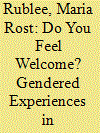

|
|
|
|
|
| Summary/Abstract |
Unlike in the broader field of international relations, relatively little research on gender representation and gendered experiences exists within the subfield of security studies. This article begins to fill that gap by sharing the results of a 2019 survey of members of the International Security Studies Section (ISSS) of the International Studies Association (ISA). The survey results show striking gender differences in members’ experiences, with women more likely than men to describe ISSS as “insular,” “clubby,” and an “Old Boys’ Network”; more likely to report experiences of hostility and exclusion; and more likely to believe that diversity initiatives are needed. Our analysis reveals that women in the ISSS report (1) harassment, (2) negative experiences participating in various section activities, (3) more significant barriers to attending and being selected for the section's ISA program, and (4) a sense of feeling unwelcome at ISSS meetings, all at higher rates than male respondents.
|
|
|
|
|
|
|
|
|
|
|
|
|
|
|
|
| 2 |
ID:
171804
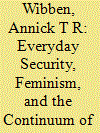

|
|
|
|
|
| Summary/Abstract |
This article returns to the original forum question “What is Global Security Studies?,” looking at it in relation to the theme of inclusion and exclusion to point out that security studies scholars exclude feminist scholarship on (everyday) security at their own peril. Showcasing the increasing body of feminist security studies scholarship, the article then highlights not only what scholarship might be included in a truly global security studies, but also the important insights (e.g., about the continuum of violence that spans peace- and wartime) that are missed without it. The article ends with a reflection on the need to also include a wider range of approaches as eminently valuable to global security studies.
|
|
|
|
|
|
|
|
|
|
|
|
|
|
|
|
| 3 |
ID:
171796


|
|
|
| 4 |
ID:
171800
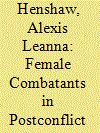

|
|
|
|
|
| Summary/Abstract |
Research on contemporary internal armed conflicts has consistently shown that women are active in most armed insurgencies, in groups with varied ideologies, and in every region of the world. However, scholarship from feminist security studies shows that, not only are women still generally underrepresented in peace processes, but women affiliated with rebel groups in particular are more likely to be excluded from disarmament, demobilization, and reintegration (DDR) efforts. Closing this gap is a necessary next step for improving the security of women. This article draws on feminist theory and feminist security studies literature to highlight four factors that contribute to the exclusion of insurgent women from DDR efforts: attributions of agency, gendered hierarchy within groups, the tendency to collapse complex intersectionalities, and the pressure for patriarchal reordering after conflict. Drawing on selected cases, I illustrate each of these factors at work and discuss the implications for female ex-combatants, policy-makers, and scholars.
|
|
|
|
|
|
|
|
|
|
|
|
|
|
|
|
| 5 |
ID:
171799
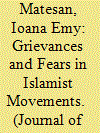

|
|
|
|
|
| Summary/Abstract |
This article examines how exclusionary policies and repressive measures affect the propensity of Islamist groups in nondemocratic settings to engage in violence. The central argument is that exclusion from electoral politics, from civil society, and from public discourse can increase political grievances, whereas symbolic threats to religious values spark sociocultural grievances; state violence and repression foster a sense of insecurity. The article proposes that Islamist groups are both principled and strategic actors, who may adopt violent rhetoric in response to political or sociocultural grievances, but who resort to violent tactics primarily out of a sense of insecurity. The quantitative examination of twenty-two Islamist groups from the Middle East confirms that exclusionary policies can spark violent rhetoric, whereas repression and threats to the physical integrity of a group increase the propensity toward violent behavior. However, when insecurity turns into disillusionment, groups can also move away from violence if they feel alienated from the public. The close investigation of the Muslim Brotherhood and al-Gama'a al-Islamiyya in Egypt shows that the response to repression depends on the length of the conflict, the level of fragmentation within an organization, and public opinion.
|
|
|
|
|
|
|
|
|
|
|
|
|
|
|
|
| 6 |
ID:
171797


|
|
|
|
|
| Summary/Abstract |
This article argues that dynamics among rivals can affect how host states respond to refugees. Particularly, refugees from rival states can motivate host countries to promote inclusive action because they are exiled from an adversary. By treating refugees well and openly respecting their human rights, host states can, in effect, shame their rival, thereby undermining the adversary's legitimacy and discrediting the opposing government in the eyes of the international community. In the absence of a strategic rivalry, host governments do not have this incentive to support refugee human rights. Using statistical analyses, I find support for these hypotheses. In particular, the arrival of refugees from a neighboring rival state are associated with the strongest increase in respect for human rights within the host country, whereas refugees from a noncontiguous, nonrival state are related to a decrease in respect for human rights.
|
|
|
|
|
|
|
|
|
|
|
|
|
|
|
|
| 7 |
ID:
171809


|
|
|
|
|
| Summary/Abstract |
In this article, I examine the relationship between migration and terrorism in Western European countries from 1980 to 2004. I find that an increase in migration is positively related to an increase in terrorism, but only right-wing terrorism. Immigration has no effect on left-wing terrorism or other non-right-wing terrorism. I also examine the effect of incoming refugees on terrorism and find similar results. I argue that these population flows increase terrorism in part because they aggravate the grievances of those on the radical right. To provide empirical support for this mechanism, I conduct a subnational analysis of right-wing terrorism in Germany. For German states, the percentage of foreign-born immigrants is a bigger predictor of anti-immigrant violence than economic variables such as employment or trade levels. The flow of immigrants from outside of Europe is also positively related with right-wing terror, while no relationship exists for intra-European migration. This analysis serves to qualify the study of terrorism as a strategic choice by showing that increased antipathy toward an out-group, rather than a changing strategic environment, explains variation in levels of terrorism, at least among liberal democracies.
|
|
|
|
|
|
|
|
|
|
|
|
|
|
|
|
| 8 |
ID:
171803
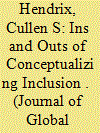

|
|
|
|
|
| Summary/Abstract |
In the field of global security studies, inclusion, both in terms of process and outcomes, is certainly having a moment. Like many terms widely adopted by the international security and development communities, the utility of the discourse around inclusion stems in part from its ambiguity. The various contributions to this special issue make good and productive use of this ambiguity and have moved the discussion of inclusive approaches to governance, violence reduction, and peace-building forward. In doing so, however, they have put forth very different conceptualizations and operationalizations of inclusion and exclusion. Thus, my contribution to this symposium identifies these various conceptualizations, discusses the strengths and weaknesses of proposed measures, and concludes with remarks on the normative implications of these analyses.
|
|
|
|
|
|
|
|
|
|
|
|
|
|
|
|
| 9 |
ID:
171807
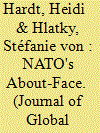

|
|
|
|
|
| Summary/Abstract |
Scholars in global security studies have only recently focused attention on how and why international security organizations (ISOs) adapt. Since the United Nations Security Council's issuance of Resolution 1325, some ISOs have enacted changes to implement gender mainstreaming. The concept involves incorporating gender-based analyses in policy and planning and increasing women's representation. Drawing on interviews with seventy-one elites and a dataset of ninety-seven NATO gender guidelines, this article introduces an original argument for why NATO adapted to gender mainstreaming. Such adaptation is surprising given the military's historical resistance to gender considerations and that civilian bodies typically enact reforms. Findings indicate that other ISOs were substantially influential in the process and that institutional incentives built into NATO's military bodies drove military officials to implement mainstreaming in practice. Additionally, military elites perceived a link between gender mainstreaming and operational effectiveness, which further consolidated organization-wide adaptation. This study challenges long-held assumptions about militaries’ resistance to gender-related changes. It also offers one of the first empirical assessments of gender mainstreaming in an ISO.
|
|
|
|
|
|
|
|
|
|
|
|
|
|
|
|
| 10 |
ID:
171810


|
|
|
|
|
| Summary/Abstract |
This article explores the relevance of the dominant, population-centered, counterinsurgency doctrine in an era dominated by Salafi-inspired state challengers. Building on Weinstein's (2007) argument, I argue that an insurgent group's emergent nature, shaped by its origin, affects how it will operate and the kind of strategy most likely to defeat it. I investigate the plausibility of my claims through an examination of Boko Haram. I demonstrate the disconnect between Boko Haram's Salafi ideology and its objective of establishing a caliphate, on the one hand, and the strategy of dialogue and socioeconomic reforms to end the insurgency, on the other. In light of this disjuncture, I argue that the key to Boko Haram's defeat lies in the mobilization of international military and intelligence resources to strengthen the Nigerian government's enemy-centered counterinsurgency operation against the group.
|
|
|
|
|
|
|
|
|
|
|
|
|
|
|
|
| 11 |
ID:
171805
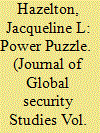

|
|
|
|
|
| Summary/Abstract |
The empirical research in this issue explores sources of security and insecurity to reveal paradoxical relationships and dangerous assumptions. Drawing on this research and earlier findings about international and intra-state security, I argue that inclusion can drive insecurity and exclusion can support security. It is normatively appealing to believe that inclusion increases security in ways that benefit humans and polities and that exclusion decreases security. Authors here, however, find that it is not necessarily so. The key to increasing security as a positive good lies in understanding the actors' interests and goals. Some states and non-state actors may want to increase security in ways that do not benefit all. Others may profit by increasing insecurity. Some actors may seek inclusion while others prefer exclusion of self or other. The articles in this issue underline the importance of accurately identifying and examining assumptions in scholarship and policymaking.
|
|
|
|
|
|
|
|
|
|
|
|
|
|
|
|
| 12 |
ID:
171806
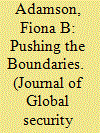

|
|
|
|
|
| Summary/Abstract |
This essay reflects on the approaches to inclusion and exclusion put forward in this special issue and suggests a more radical alternative: the project of “decolonizing” the field of security studies. Drawing on work in decolonial thought and critical security studies, I discuss systemic-level structures of inclusion and exclusion such as global racial hierarchies, imperial and colonial legacies, and North-South inequities. Such structures both shape the material reality of the global security order, and affect knowledge production in the field of security studies itself, including the definition of what is and is not viewed as a legitimate “security issue.” I conclude by asking what a “decolonized” security studies might look like.
|
|
|
|
|
|
|
|
|
|
|
|
|
|
|
|
| 13 |
ID:
171808
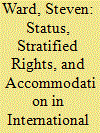

|
|
|
|
|
| Summary/Abstract |
Denied status claims can produce serious interstate conflict and accommodation may thus be an important means of avoiding conflict with rising and reemerging status seekers such as China and Russia. But accommodation is an underdeveloped concept. This article draws on scholarship about recognition and hierarchy to propose a novel means of understanding status accommodation: as behavior that sends signals to status seekers about the validity of claims to stratified rights. This framework implies that acts that signal status denial (and thus cause conflict over status) may be driven by three broad kinds of processes: anxiety about a state's position in the world; incompatibility between nonstatus interests and claims to status-implicated rights; and fears about the implications of status accommodation for the validity of discourses and ideas that produce both international and domestic order. These dynamics—especially the latter two—may be linked to domestic political mechanisms and concerns in ways that analysts do not fully appreciate. I illustrate the framework by examining the forces that drove the United States to deny Japanese claims to equal status during the decades before World War II.
|
|
|
|
|
|
|
|
|
|
|
|
|
|
|
|
| 14 |
ID:
171801
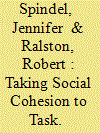

|
|
|
|
|
| Summary/Abstract |
Recent political debates over the inclusion of transgender servicemembers in the US military center around the impact such inclusion will have on unit cohesion and effectiveness. Missing from the debate, however, are the perceptions of those who do the soldiering. What are their perceptions of cohesion? Do they, like political leaders and the general public, believe unit cohesion leads to military effectiveness? In other words, how much does the narrative at the elite level—that insists excluding minority groups is a military necessity—match the perceptions of those who serve? Drawing on an original survey of 151 current and former members of the US military, our results suggest that servicemembers’ perceptions mirror those in the general public: political ideology is correlated with beliefs that minority groups disrupt unit cohesion. We find that conservatives are more likely to believe that the inclusion of transgender soldiers will negatively impact cohesion and undermine unit effectiveness. Moreover, conservatives are more likely to endorse a conceptualization of cohesion that hinges on the social—“people like me” or “band of brothers”—dynamics of cohesion rather than more professional, task-oriented conceptions of cohesion. However, military experience affects these perceptions: respondents with combat experience, who held/hold a higher rank, and who are currently serving are more likely to endorse a task-based conception of cohesion that ties cohesion to professionalism and competence, rather than social identity.
|
|
|
|
|
|
|
|
|
|
|
|
|
|
|
|
| 15 |
ID:
171798
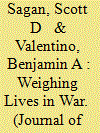

|
|
|
|
|
| Summary/Abstract |
This article explores how the American public weighs tradeoffs between foreign and compatriot fatalities during war. This focus provides an important window into the meaning and significance of citizenship and national identity and, in turn, the most fateful consequences of inclusion and exclusion in the international context. To examine these attitudes, we conducted an original survey experiment asking subjects to consider a fictional US military operation in Afghanistan. We find that: (1) Americans are significantly more willing to accept the collateral deaths of foreign civilians as compared to American civilians in operations aiming to destroy important military targets; (2) Americans are less willing to risk the lives of American soldiers to minimize collateral harm to foreign civilians as compared to American civilians; (3) Americans who express relatively more favorable views of the United States compared to other nations are more willing to accept foreign collateral deaths in US military operations; and (4) Americans are more willing to accept Afghan civilian collateral deaths than those of citizens from a neutral state, such as India. Many Americans recognize that placing a much higher value on compatriot lives over foreign lives is morally problematic, but choose to do so anyway.
|
|
|
|
|
|
|
|
|
|
|
|
|
|
|
|
| 16 |
ID:
171802


|
|
|
|
|
| Summary/Abstract |
Arguments about the importance of vernacular security focus on its positive and inclusive potential for peacebuilding. Reflecting on the special constitutional and sociopolitical challenges post-conflict societies face in the aftermath of conflict, though, this article focuses on the way perceptions of security and security in the vernacular can exacerbate exclusionary effects in post-conflict societies. I discuss current approaches to security concepts dealing with social perceptions of (in)security and the linkages made in research between vernacular security and local peace. But I also highlight exclusionary structures in post-conflict settings, which are most often marked by distrustful social relations, as a byproduct of security measures. I argue, in contrast to current assumptions in research on security in the vernacular, that everyday measures not only have positive implications for peacebuilding but can also lead to social exclusion, fostering violence and hindering social equality, development, and peace.
|
|
|
|
|
|
|
|
|
|
|
|
|
|
|
|
|
|
|
|
|